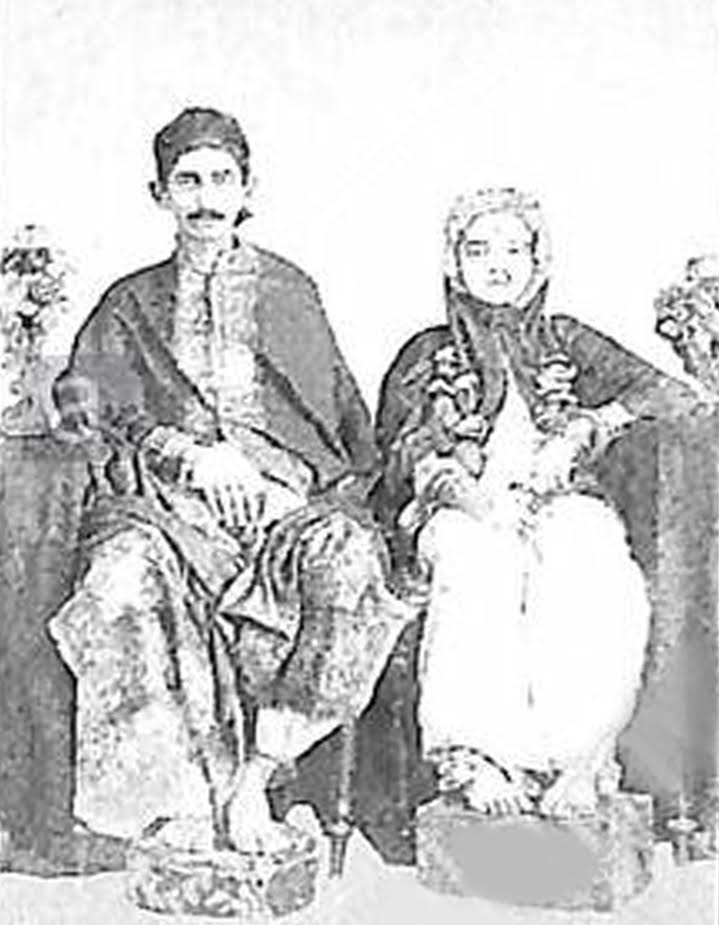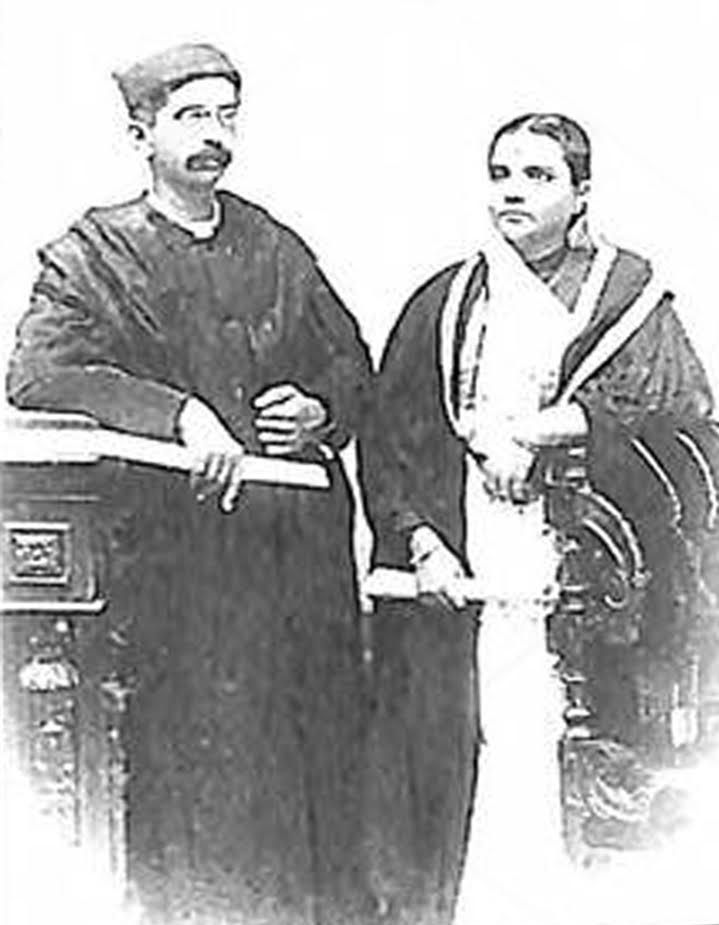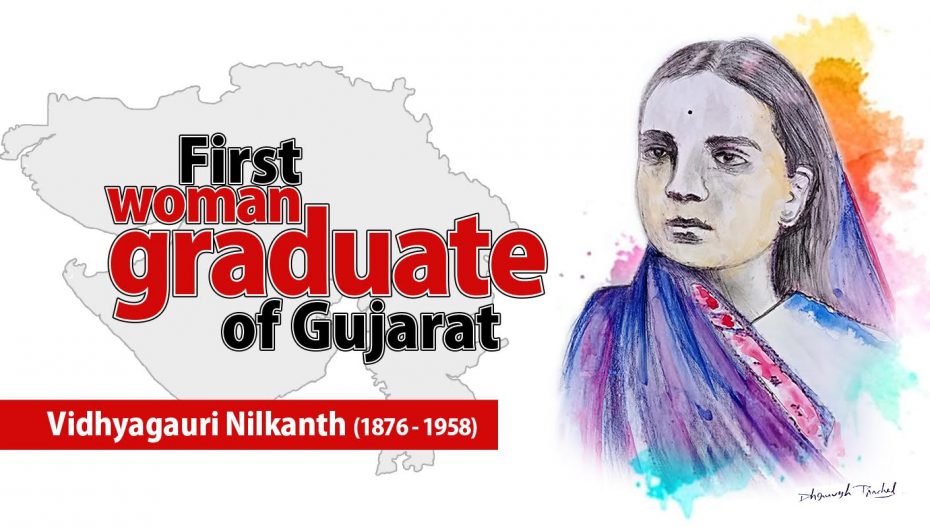In the year 1908, when Vidyagauri Nilkanth sang Vande Mataram at the annual session of the Indian National Congress in Ahmedabad, she demolished a taboo. At the time, no ordinary woman dared sing on stage in front of a crowd. But then, Vidyaben was no ordinary woman — she was the first woman to graduate from university in Gujarat.
Vidyagauri’s story seems unimaginable in today’s world of virtual learning and digital schools where women are vying for combat roles in the armed forces, but it is due to the persistent efforts of people like her that the Indian woman could enter the corridors of formal education — and eventually shatter every glass ceiling.
Vidyagauri Nilkanth was born in Ahmedabad on June 1, 1876, to a progressive family. Her maternal grandfather, Bholanath Divetia, was a social reformer and founder of the Gujarat Prarthana Samaj. He was influenced by the thoughts of Bengal’s famous social reformer and educator Ishwar Chandra “Vidyasagar” — an honorific he earned through his vast knowledge. Hence, Bholanath Divetia named his granddaughter Vidyagauri.
Bholanath firmly believed that women should not be deprived of education. However, even liberal thought must be judged in the context of the time. Vidyagauri was married off by age 13 — to 21-year-old Ramanlal Nilkanth.

But Ramanlal’s family was not a typical conservative family either. In fact, Vidyagauri’s in-laws were at the forefront of the reformist movement. Her father-in-law, Mahipatram Rooparam Nilkanth, was the first Nagar Brahmin to go to England for studies. During his stay abroad, he realised that only education can clear society of the cobwebs of conservatism.
Ramanlal, who had inherited that progressive gene, encouraged his wife Vidyagauri to take the matriculation exam. He also helped her prepare for the examination. After clearing the matriculation examination, Vidyaben secured admission to Gujarat College which was then affiliated with Bombay University.
In 1901 she graduated in philosophy, securing first rank in the university — Gujarat’s first female graduate. She had made history.

Like most pioneers, Vidyaben wanted to be a shining light for the darkness in the lives of others. She continued to strive for the uplift of backward, widowed and destitute women.
She was associated with many organisations working for social reform — such as the Mahipatram Ruparam Orphanage, the Gujarat Vidya Sabha, Prarthana Samaj, Victoria Jubilee Hospital, Diwalibai Kanyashala, Ranachhodlal Chhotabhau Kanyashala, Maganbhai Karamchand Girls’ School, Gujarat Sahitya Sabha.
Along with being the first woman graduate of Gujarat, she was also the first woman to be a nominated member of the Ahmedabad Municipal Corporation. During her tenure, she was vice-president of the civic body as well as chair of the municipal school board.
She was never ambitious for power; the only purpose of her life was to help the poor, exploited, destitute women and children.
In 1936, on Vidyagauri’s 60th birthday, Mahatma Gandhi said: “No celebration is enough for Vidyaben because she is an ornament of Indian womanhood. The more we can honour her, the better. She is an ardent social reformer but at the same time maintains our tradition.”
Vidyaben started the Gujarat branch of the Akhil Bharatiya Mahila Parishad, of which she was the president for many years. She was elected as the president of the Akhil Bharatiya Mahila Parishad at its Lucknow convention. She took up the task of eradicating illiteracy among women. She made many efforts in tandem with the government to open compulsory primary education and vocational schools in every corner of India. She also introduced different subjects in the curriculum so that women could have a choice in education.
Vidyaben placed equal emphasis on social reforms. She fought against child marriage, dowry, restrictions on widow remarriage, polygamy, and for the reform of divorce laws. She also recommended reforms in Hindu laws for inheritance for women. She set up Gujarat Stree Kelavani Mandal that conducted awareness programmes on higher education for women.
Vidyaben was also a good writer and contributed to women’s magazines. She and her sister Shardaben Mehta translated historian R C Dutt’s book Lake of Palms into Gujarati. She also helped her husband Ramanlal Nilkantha in writing a journal, Gyansudha, and other books.
In 1918, Vidyagauri Nilkanth became the first woman president of Gujarat Sahitya Parishad. During her tenure she built libraries at many places across the state.
She also made significant contributions to the National Planning Committee, which was formed under the chairmanship of Jawaharlal Nehru in the 18th Indian National Congress.
For her invaluable contribution to welfare of the society, the British government awarded her with the M.B.E (Member of the Most Excellent Order of the British Empire) and the Kaisar-i-Hind.
When Vidyagauri Nilkanth passed into the ages on December 7, 1958, India lost a trailblazer who devoted her life for the uplift and betterment of the lives of women and children.












